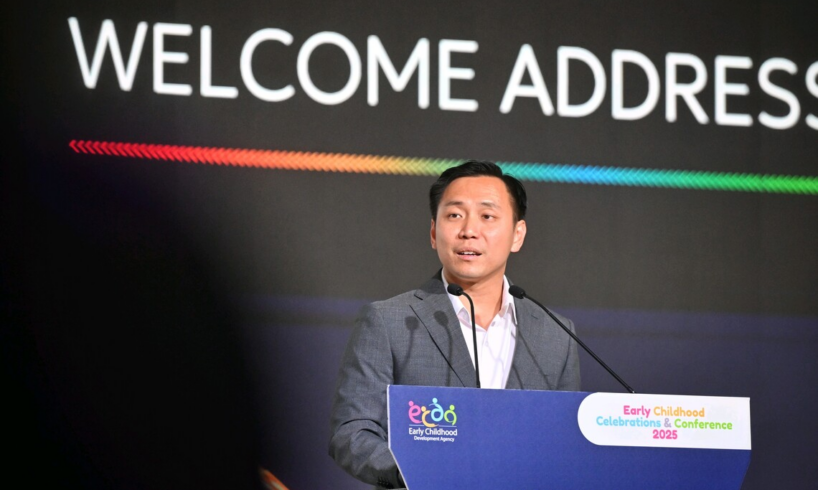
SINGAPORE – About 600 more children with developmental needs will soon get the opportunity to learn in inclusive environments, receiving additional support within their pre-schools.
Under the Early Childhood Development Agency’s (ECDA) Inclusive Support Programme (InSP), children with developmental needs requiring medium levels of early intervention receive targeted support, enabling them to learn alongside their peers in the same school.
Launched in 2021 with an initial 150 places, a study of InSP has shown “promising findings”, said Minister for Social and Family Development Masagos Zulkifli on Sept 25. Research showed that children supported through InSP made significant progress in closing developmental gaps in language, cognitive skills and daily functional abilities.
From 2026, ECDA will add the 600 more places progressively, said Mr Masagos. They will be spread across 15 to 20 pre-schools run by anchor and selected partner operators.
Speaking via video link on Sept 25 to some 2,200 educators and partners at a two-day biennial early childhood conference, Mr Masagos said the three-year pilot showed that inclusive practices strengthen overall teaching quality and benefit all children.
For instance, pupils with typical development in InSP pre-schools demonstrated notable cognitive gains and were three times more likely to engage peers with developmental needs in group activities than children in non-InSP pre-schools.
This programme is one example of how pre-schools are adapting to the diverse needs of children and using evidence-based practices to better serve the children, said Mr Masagos. “This spirit of excellence will uplift the quality across our sector, ensuring every child receives the support they need to thrive,” he added.
InSP integrates early childhood education and early intervention for children aged three to six with medium developmental needs. Delivered in pre-schools, it provides five to 12 hours of weekly intervention by early intervention professionals and allied health staff, with support integrated seamlessly with group activities and one-on-one sessions.
For parents like Ms Nur Hidayu, 27, having InSP available to her two sons gave her hope for their future, as she observed their progress through the programme.
“Watching them be able to socialise, make friends and laugh alongside them… it actually gives me so much joy,” said Ms Hidayu, who works as a spa receptionist.
Both of her sons – Adi, five, and Afi, six – have developmental needs. The younger boy has academic and behavioural issues, and the older has mild autism.
Before joining the programme, Afi had to move between his pre-school and an external centre for support. This constant back-and-forth was disruptive for him as he struggled to adapt to two different environments, and he was unable to be with his friends at pre-school.
With InSP, Afi is able to remain with his friends, which helped him become more sociable and talkative, said Ms Hidayu.
Meanwhile, Adi has begun to pay more attention during class and write independently, and has learnt strategies to manage his stutter, she added.
The progress the boys have made through InSP goes beyond academic skills, noted Ms Hidayu, as they have improved in the ability to communicate their desires, needs and emotions more effectively.
“The progress they’ve shown throughout the programme reassures me that they can go far in life, and gives me hope and confidence for the future,” she said.
“I hope (the programme) benefits other families the way it did mine, and for parents going through similar struggles to know that they are not alone,” she added.
Ms Nur Hidayu, 27, seen here with her husband Al Afiq Khairani, 28, and their two sons Adi (left), five, and Afi, six, said she saw the two boys’ progress through InSP.
PHOTO: COURTESY OF NUR HIDAYU
Over the two-day conference, held at the Sands Expo and Convention Centre, Mr Masagos and Minister of State for Social and Family Development Goh Pei Ming announced new initiatives to foster greater inclusivity and innovation in the pre-school sector, and to recognise the contributions of parents and educators.
Mr Masagos unveiled the new Quality Teaching Tool, designed to help educators identify strengths and areas for growth in their practice, pedagogy and interactions with children. The tool was developed by ECDA and the National Institute of Education based on international research and input from local professionals.
He also noted that ECDA will review the industry digital plan to better support the use of technology in pre-schools.
On the second day of the conference on Sept 26, Mr Goh honoured 25 early childhood and early intervention educators and leaders and pre-schools for their excellence in teaching, leadership and innovation. He also said that starting 2026, the ECDA awards would showcase inclusive practices, and offer higher prize amounts to better reward professional excellence.
Attendees at the Early Childhood Celebrations and Conference on Sept 26.
ST PHOTO: ARIFFIN JAMAR
Parents were also honoured at this year’s conference for the first time, for their contributions to the pre-schools. Some 300 parents were nominated by their children’s educators under the initiative by ECDA and the Singapore Kindness Movement, known as Our Wonderful Parents.
“Each of you – educator, parent or partner – brings unique strengths and has a vital role to play in uplifting quality in early childhood,” Mr Goh said.
“Together, let’s continue to create environments where children’s natural curiosity and love of exploration can flourish through meaningful experiences that honour how young minds truly learn and grow,” he added.





